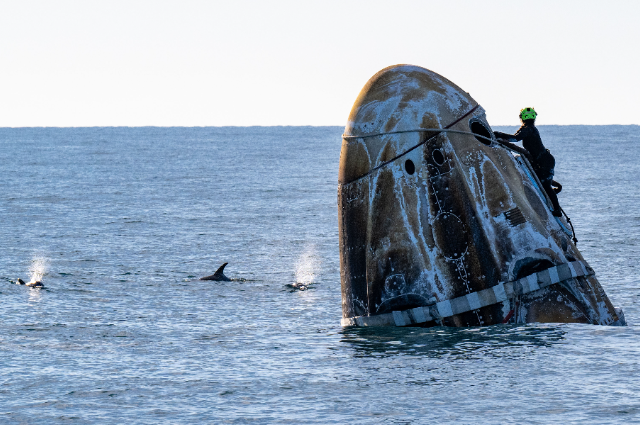Sunita Williams was greeted by dolphins, swimming in the blue, awaiting the return of the astronauts from space. Sunita William’s and Butch Wilmore’s nine-month retention in space was brought to finality as they landed back on earth on SpaceX’s Dragon Spacecraft. It was reiterated by NASA that she was not “stuck” or “stranded” in space. And lifeboats were kept ready to rescue Sunita and Butch, but they needed to be brought back at the right time. A mission that was meant to last a week ended up lasting months due to difficulties with the Boeing Starliner.
The SpaceX Dragon capsule which was called Freedom faced temperatures of around 3,000 degrees Fahrenheit as it re-entered the Earth’s atmosphere. It was a successful rescue mission by Crew-9.
Her achievements in space face 62 hours and 6 minutes of spacewalk through the course of her career, putting her at 4th place on NASA’s list, recording all times. In her latest mission, which was Starliner and SpaceX, she was in space for 286 days. They had reached the International Space Station (ISS) on June 5th, 2024. Boeing’s new Starliner crew capsule had been launched on June 5th, and due to problems that found their way to the space station, NASA sent Starliner back empty and the pilots were transferred to SpaceX. And issues with the SpaceX capsule delayed it further.
Not to mention, President Donald Trump asked SpaceX founder Elon Musk in January to hurry the return of the duo, and blamed the late return on Biden’s administration. The completely new Space X capsule was not ready to fly, so a used one was kept in its place, and that set forth the mission to retrieve the Starliner duo. The duo maintained their support for NASA’s decisions. SpaceX and Boeing were hired by NASA after the shuttle program came to an end. These two U.S companies were hired to facilitate the transport of astronauts to and from the space station.
Although they did not particularly mind staying in space a little longer, they dearly missed their families. Sunita William had internet calls with her husband, and mother and Butch Wilmore missed his daughters, the younger one being in her senior year of high school which he missed.
The physiological changes as a result of the extended time spent in space were discussed as Sunita William’s hair had greyed, which was received as a stark transformation. NASA elaborated with,
“This may seem far-fetched, but spaceflight induces major physiological changes, including accelerated muscle and bone density loss and immune system dysfunction—effects that parallel natural aging on Earth."
The New York Post covered her diet in space which comprised of pre-packaged food such as pizza, roast chicken, and even shrimp cocktails aboard the International Space Station (ISS). The astronauts had restricted access to fresh produce to maintain that they were receiving a nutritious diet in space. Their calorie intake was also monitored for health reasons.
"A mission of this length definitely poses a much greater risk of long-term muscle atrophy and strength loss, which are often impossible to fully reverse," Dr. Shenhav Shemer, professor of Biology at the Technion - Israel Institute of Technology, said. "The first priority upon Wilmore and Williams' return will be getting their sense of proprioception - or how the body maintains its sense of position and balance - under control. Usually this takes only a few days, but given the length of their mission it may take longer,” he told ABC news. The adverse effects of prolonged stay are met with technological advancements and necessary routines to sustain healthy conditions. Changes may occur due to microgravity. And exposure to space radiation, which contains three different kinds of radiation; particles trapped in Earth’s magnetic field, particles from solar flares, and galactic cosmic rays, NASA said. And to resolve isolation in space, the crew is carefully selected and trained, to enable them to handle missions that may last for long durations. Researchers are working on the alleviation of isolation by indulging in experiences provided by virtual reality and alternative activities.
"In low earth orbit where the ISS is, astronauts are at least partially protected by the magnetosphere that protects Earth from the radiation exposure of deep space," Dr. Rihana Bokhari, scientific research director at Baylor College of Medicine's Translational Research Institute for Space Health, had told ABC news before. "However, they do have a greater radiation exposure than those on Earth because the ISS passes through areas of trapped radiation in their orbit," she continued. "Butch and Suni, since they are on the ISS, will not be exposed to enough radiation to seriously cause large impacts on body systems but the long duration exposure to greater radiation than on Earth could lead to an increase in the risk of cancer."
Sunita William and Butch Wilmore will be shifted to the Johnson Space Center in Houston for health checks as a very ncessary routine, and they will return home after receiving approval by the NASA flight surgeons. Sunita Williams is keen to return home to her family which includes her two dogs,
“It's been a roller coaster for them, probably a little bit more so than for us,” she said.

